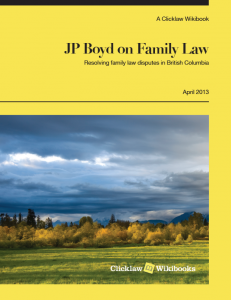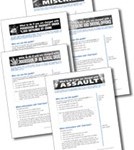JP Boyd on Family Law: A New Clicklaw Wikibook
 BC lawyer John-Paul Boyd has updated his popular family law website, and with some help from Courthouse Libraries BC, it has been re-launched as a Clicklaw Wikibook, JP Boyd on Family Law.
BC lawyer John-Paul Boyd has updated his popular family law website, and with some help from Courthouse Libraries BC, it has been re-launched as a Clicklaw Wikibook, JP Boyd on Family Law.
JP Boyd on Family Law reflects the changes that came into effect in BC last month with the new Family Law Act. It offers practical, indepth information written in plain language on a wide range of family law topics, including:
- resolving problems out of court,
- family law agreements,
- child support & spousal support, and
- property & debt.
This new Clicklaw Wikibook includes over 50 “How Do I” pages, a legal glossary, links to court forms and examples of documents. JP offers the same tone and frank, pragmatic (and often humorous) approach to family law issues that made bcfamilylawresource.com such a valued resource.
JP Boyd on Family Law continues to complement other updated sources of family law information, including the Family Law in BC Website from LSS and other family law resources available through Clicklaw.
For more information about JP Boyd on Family Law, see the one-sheeter describing this new Clicklaw Wikibook and the news release announcing the launch of JP Boyd on Family Law.
What are Clicklaw Wikibooks?
Clicklaw Wikibooks are collaboratively developed, plain language legal publications that are born-wiki and can also be printed. Using the same technology that powers Wikipedia, they are updated over the Internet by a team of qualified contributors. They are free to access and download, and can be printed as a softcover book at a low cost. They enable legal information to be shared widely with British Columbians who seek reliable, up-to-date information to address legal issues or learn about the law.
The Clicklaw Wikibook format makes the information easy to search, easy to update, and easy to turn into a print resource. In fact, later this spring, we’ll be working with public libraries to make sure a print version of JP Boyd on Family Law is available at your public library.




